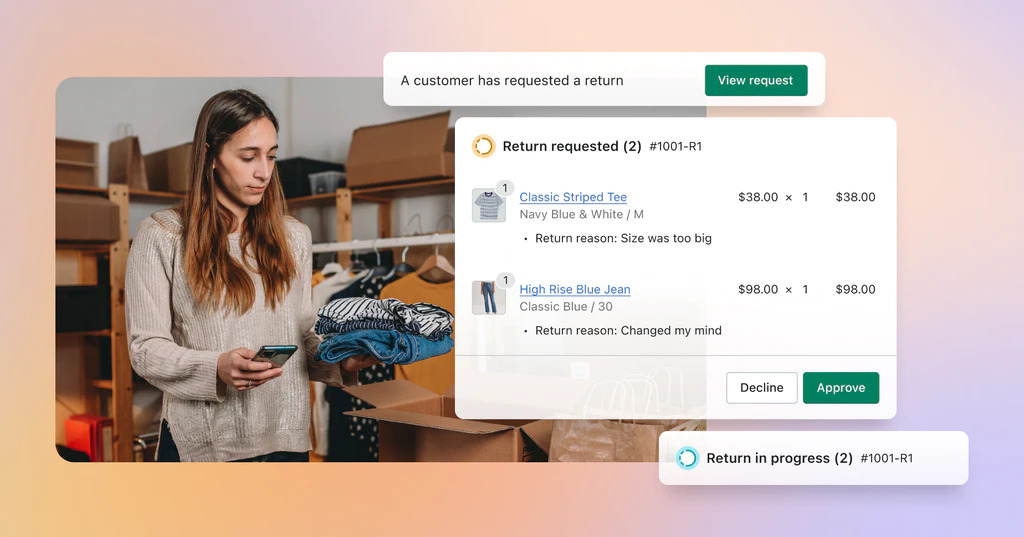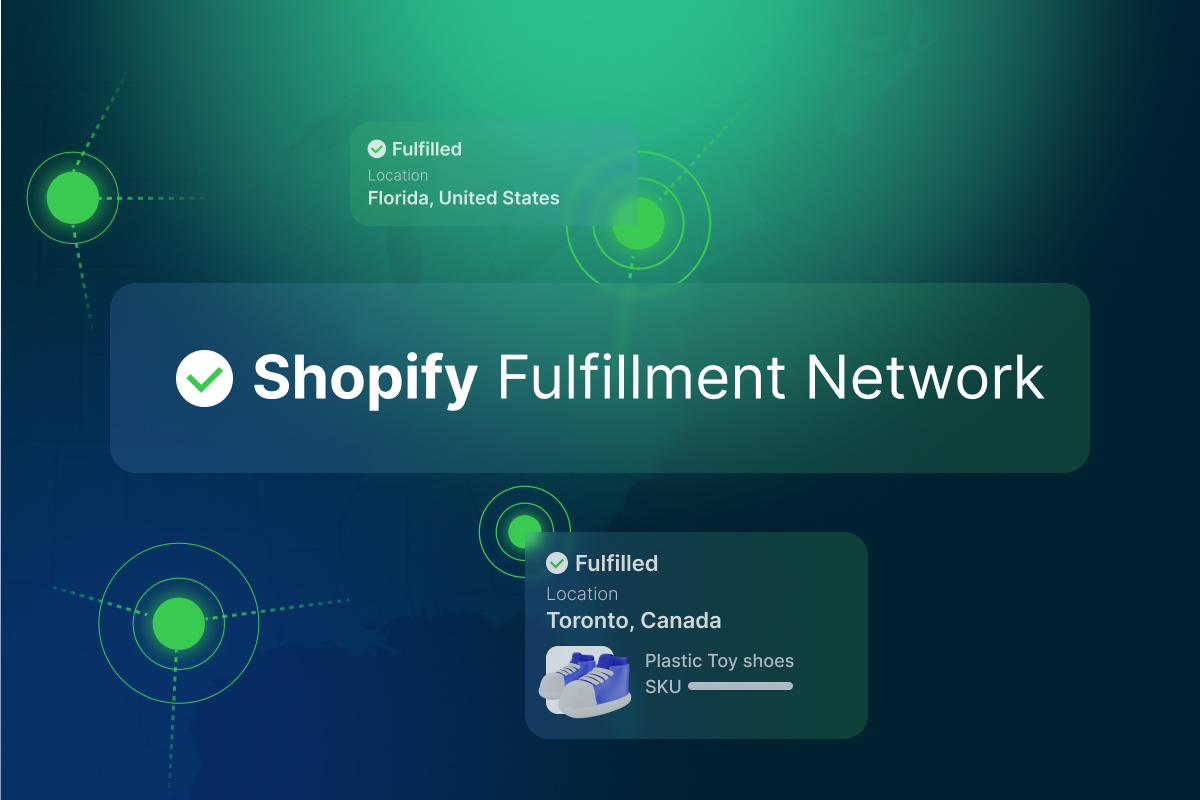Table of Contents
Fulfillment is a critical aspect of eCommerce businesses. The faster and more efficiently you can get your products to your customers, the happier they’ll be, and the more likely they’ll be to return to your store in the future.
The ideal solution to make your fulfillment process more hassle-free is by using Shopify Fulfillment Network (SFN), a solution offered by the popular eCommerce platform Shopify.
In this article, we’ll give you an in-depth exploration of “SFN”, including its key features, fees, eligibility requirements, and pros and cons. Let’s go!
What Is a Fulfillment Service?
Before diving into Shopify Fulfillment Network specifically, let’s first define what a fulfillment service is. A fulfillment service is a third-party provider that takes care of all the logistics involved in getting your products to your customers. This includes storing your inventory, picking and packing orders, and shipping them out.
By partnering, business owners can focus on other aspects of their business, such as marketing and customer service, while the provider takes care of order fulfillment. This can help you save time and money while providing your customers with a seamless and efficient fulfillment experience.
Overview of Shopify Fulfillment Network
Shopify Fulfillment Network or SFN is a powerful solution offered by Shopify, a popular eCommerce platform used by over 2 million businesses worldwide. It is designed to help merchants simplify their order fulfillment process by automating the storage, picking, packing, and shipping of their products.
Shopify Fulfillment Network enables you to store your inventory and fulfill your orders using Shopify’s fulfillment centers.
Simply put, you DON’T have to fulfill the orders by yourself.
With SFN, merchants can store their inventory in Shopify’s network of fulfillment centers across the United States.
How does it work?
- When a customer places an order, Shopify’s system automatically selects the closest fulfillment center and sends the order there for picking and packing.
- Once the order is packed, it’s shipped out to the customer using the most cost-effective and efficient shipping method.
Key Features of Shopify Fulfillment Network
To help merchants streamline their order fulfillment process, Shopify Fulfillment Network offers a range of features. Here are some of the key features:
1. Automated inventory management
One of the key features of Shopify Fulfillment Network is its automated inventory management system. Shopify’s system automatically tracks your inventory levels across all of its fulfillment centers, so you always know how much stock you have on hand.
With this feature, SFN ensures that you never run out of stock and can always fulfill customer orders. With the automated inventory management system, you can focus on other aspects of your business, such as marketing and customer service, while Shopify Fulfillment Network takes care of your inventory.
2. Real-time order tracking
Another key feature of Shopify Fulfillment Network is its real-time order tracking system. Merchants can track their orders in real time, from the moment the order is placed to the moment it’s delivered.
Real-time order tracking gives merchants peace of mind and allows them to provide better customer service by quickly addressing any issues that may arise. It also helps build trust and loyalty with customers by keeping them informed about the status of their orders.
3. Custom packaging and branding
Shopify Fulfillment Network offers custom packaging and branding options, so you can create a unique unboxing experience for your customers. This feature can help increase brand loyalty and drive repeat business.
By offering custom packaging and branding options, you can differentiate your brand from your competitors and provide your customers with a memorable and enjoyable shopping experience. With Shopify Fulfillment Network, you can create custom packaging and branding that reflects your brand’s values and personality.
4. Returns management
Shopify Fulfillment Network also offers a returns management system that can help you manage returns more efficiently. Shopify’s system automatically processes returns and restocks returned items back into your inventory.

This feature makes it easy for merchants to manage returns and ensures that their inventory levels remain accurate. With the returns management system, you can streamline your returns process and keep your customers happy.
Fees Involved in Using Shopify Fulfillment Network
Using Shopify Fulfillment Network incurs fees, just like any other fulfillment service. Because Shopify Fulfillment Network offers custom pricing, estimating how much you would pay without first requesting a quote is difficult.
In our experience, the process is quick and simple; simply request a quote on their website, and you’ll be contacted shortly thereafter by a representative with an estimate. Also, if money is an issue early on, know that you have the option of eliminating some fulfillment elements to save money.
Shopify will provide a quote to each store based on the following criteria:
- Transportation needs: They calculate your shipping rates automatically to ensure that you get the best deal possible. Their shipping costs are determined by the weight and dimensions of your package, as well as the distance it must travel. They use a zone-based shipping model, which means that the more zones your package travels through, the more it will cost.
- Packaging requirements: You will be charged a fee whenever SFN removes an order from your inventory to pack or ship it to customers.
- Storage requirements: Your daily storage rate will be influenced by the amount of space your inventory takes up in the fulfillment warehouse.
- Special projects: Shopify Fulfillment may handle unique treatments for your project, such as bundling, inbound receiving, marketing inserts, and branded packaging, for an additional price.
In accordance with the type of charge, SFN charges are added to your Shopify statement at varying frequencies. For example, delivery fees are added to your Shopify account the following day, whereas storage fees are added toward the end of the calendar month.
If you want to have a more practical example besides calculating shipping costs. The table below shows the Shopify fulfillment cost for SFN as well as how frequently they are billed in the United States:
| Fees | Description | Billing frequency |
| Domestic Fulfillment | A fulfillment fee is applied to each order completed in the United States. This charge covers receiving the order, packing it, any necessary materials, and domestic transportation. | When the order has been fulfilled |
| International Fulfillment | Every overseas order that is completed incurs fulfillment fees. These expenses include inbound reception, pick and pack, supplies, and foreign transportation. | Daily |
| Storage | Products that sell within 180 days (6 months) of being dispatched to an SFN fulfillment center incur no storage fees.
Products that remain unsold after 180 days and are still taking up space in your inventory are subject to a long-term storage cost. |
Monthly |
| Domestic Returns | When a customer returns an item, SFN assesses domestic return costs to cover the expense of returning the package to the SFN fulfillment center and processing the return. | Daily |
| Non-compliant Inbound Receiving | When an inbound transfer fails to meet SFN rules, the sender may be assessed a non-compliance fee when it arrives at an SFN fulfillment center. | Daily |
| Barcode Relabeling | Relabeling fees will be imposed if products arrive at SFN with unreadable, inaccurate, or missing barcodes. | Daily |
| Special Projects | If you require SFN workers to work on a special project that is not covered by the pick-and-pack rates, an hourly fee will be charged. | Monthly |
With SFN, your order fulfillment costs are rolled into your Shopify subscription. In addition, Shopify has also worked with USPS and UPS to offer its customers the best available pricing for product delivery.
Who Are Eligible To Use Shopify Fulfillment Network?
The Shopify Fulfillment Network is developing rapidly, but as of right now, there are some limitations to which types of merchants can join. If your business meets the following criteria, Shopify Fulfillment is perfect for you:
1. Be located in the United States
As previously stated, you may ship to other countries, but all orders processed through Shopify Fulfillment must originate from the United States. While this may alter in the future as more facilities become accessible globally, all things must now be imported from the United States.
2. Use Shopify
Obviously, merchants must be using Shopify as their eCommerce platform. If you’re not currently using Shopify, you’ll need to switch and set up your Shopify store to use Shopify Fulfillment Network.
| 💡Learn more about Shopify: |
3. Meet inventory requirements
Merchants must have a minimum of 10 different SKUs and at least one unit of each SKU in Shopify’s fulfillment centers. This requirement ensures that merchants have enough inventory to make using Shopify Fulfillment Network worthwhile.
- The maximum number of SKUs allowed is 2,000.
- The Shopify Fulfillment Program is available to any business that ships between 10 and 10,000 orders each day. If you need to ship more than 10 products per day or if your company is growing quickly and needs to ship a maximum of 10,000/day, then this program is for you.
- Perishable and regulated items cannot be sold. If you’re not sure whether your products are perishable or regulated, reach out to Shopify support for guidance. Examples of perishables include fruit or meats, while some examples of regulated items are gambling, firearms, and drugs.
Pros and Cons of Shopify Fulfillment Service
If you’re looking to outsource your order fulfillment, keep reading to learn more about Shopify Fulfillment Network. Here are a few of the most important ones to bear in mind:
Pros
- Simplifies order fulfillment: By automating the storage, picking, packing, and shipping of your products, Shopify Fulfillment Network simplifies the order fulfillment process, freeing up time for you to focus on other aspects of your business.
- Custom packaging and branding: The ability to create a unique unboxing experience for your customers can help increase brand loyalty and drive repeat business.
- Real-time order tracking: The ability to track orders in real-time gives merchants peace of mind and helps them provide better customer service, as they can quickly respond to any issues that arise.
- Cost-effective shipping: Shopify negotiates discounted shipping rates with carriers on behalf of its merchants, making shipping more affordable.
Cons
- Limited to the United States: Currently, Shopify Fulfillment Network is only available to merchants located in the United States. If you’re an international merchant, you’ll need to look for other fulfillment options.
- Not suitable for all merchants: Merchants with low order volumes or who prefer to handle their order fulfillment may not benefit from using Shopify Fulfillment Network. Additionally, the fees charged by Shopify Fulfillment Network can add up quickly, especially for merchants with a large number of SKUs.
Conclusion
Shopify Fulfillment Network can be an effective tool for eCommerce businesses to expedite their order fulfillment process by automating the storage, selection, packaging, and shipping of products, allowing merchants to focus on developing their brand and providing exceptional customer care.
Although there are fees associated with using Shopify Fulfillment Network, the benefits frequently exceed them. The service shortens processing and shipping times and allows businesses to stay near to their customers, giving a better experience.
Finally, if Shopify Fulfillment Network is the greatest option for your business will be decided by its type and future goals.



